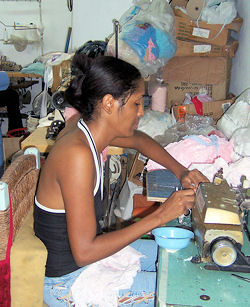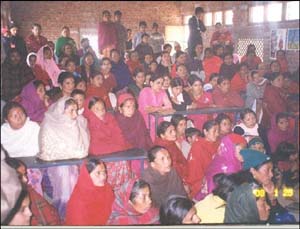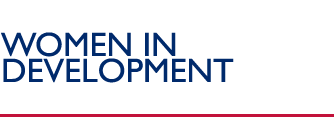 |
USAID Supports Gender Equality and Women's Empowerment
 |
| Seamstress at a small clothing manufacturer in Villa Pantis, La Romana, Dominican Republic Credit: DTS |
Throughout the developing world, women are vital economic actors, representing a larger percentage of the work force than ever before.
- USAID supported Jordan's two leading businesswomen's associations, strengthening their capacity to establish women-friendly work environments, and establishing a network of women power-brokers to support rising women leaders. USAID is expanding employment and entrepreneurial opportunities for women in the tourism and hospitality sector.
- In Lebanon, U.S. assistance created employment and increased the income of rural women through skills, resources, equipment and information, and integration into economic activities in agri-business and rural tourism. More than 300 women were assisted in the agribusiness sector, and more than 347 women have been economically integrated into the rural hospitality sector.
- With USAID assistance, more than 2,600 women in El Salvador received agricultural training to raise efficiency and ensure occupational safety; 850 women received trade/investment support to take advantage of CAFTA-DR opportunities; and 2,155 women were trained in natural resources management and biodiversity conservation.
Although political leadership positions are still largely held by men, the number of female political leaders has increased significantly over the past few years.
- The USG supports greater involvement of women in politics in Cambodia. In 2007, significant advances included a doubling of women at all local levels, increases in the number of women political candidates, and improved placement rank on the candidate list for the commune elections in 2007. The number of women councilors elected doubled as a result of capacity building and skill training.
- USAID sponsored post-electoral roundtable discussions in eight regions of Peru focusing on the participation of women in politics. These discussions informed concrete proposals for legislative reforms to increase opportunities for women to compete for elected positions.
- In Somalia, the USG provided assistance to civil society organizations to lobby for increased participation of women in political processes. In South and Central Somalia this led to the increased participation of women in the National Reconciliation Congress and the inclusion of women's issues in the agenda.
Education is a priority for USAID with a special emphasis on improving opportunities for girls, women, and other underserved and disadvantaged populations. Sixty-three percent of USAID basic education programs in 52 countries explicitly address girls' education and gender equality in education.
- In Africa, girls account for a majority of the approximately 40 million primary school-aged children who are not enrolled in school. To close that gap, the
Ambassadors Girls' Scholarship Program, a component of President Bush's Africa Education Initiative, will provide 550,000 scholarships by 2010 to African girls at the primary and secondary levels. To date, over 300,000 scholarships have been given to girls in 40 countries.
- In Morocco, a literacy program was designed to provide women with information on their family code rights. More than 9,550 women received training; among the trainers and supervisors, 85 percent were women.
Violence touches the lives of women and girls in every region in the world. Globally an estimated one in five women will be a victim of rape or attempted rape in her lifetime. Violence kills or disables the same number of women between the ages of 15 and 44 as cancer does. USAID is committed to preventing and responding to gender-based violence by addressing the root causes of violence; improving protection services to victims; and supporting legislation and enforcement.
- The President's Initiative for Women's Justice and Empowerment in Africa is working to curb violence against women, protecting those who have been victimized, and bringing the perpetrators to justice. Together with the Departments of State and Justice, USAID is implementing the $55 million program in four countries: South Africa, Zambia, Kenya, and Benin.
- USAID recently completed a successful five-year Women's Legal Rights Initiative in 10 developing countries from Southeast Europe to Africa to Latin America. Public awareness and support for women's legal rights is on the increase thanks to American foreign assistance.
- In Benin, U.S. assistance has helped the public understand and comply with a sweeping new code of family law giving unprecedented rights to women.
- In Guatemala, USAID trained community leaders to earn paralegal certificates for work against domestic violence.
- In 2007, over 800 child marriages were prevented in Ethiopia, and 14,000 child marriages have been deferred or cancelled in that country since 2004.
- In India, USAID provides support to legal counseling centers and a network of lawyers and paralegals to provide safe, accessible legal and psycho-social counseling services.
- USAID's Safe Schools Program, with pilot projects in Ghana and Malawi, is making a ground-breaking contribution to the global cause of curbing gender violence in and around schools.
- USAID funds initiatives related to rape crisis counseling in the Democratic Republic of the Congo, Haiti, Jordan, Liberia, South Africa, and Sudan.

|
| Our Daughter/Our Pride - a Nepalese women's group participates in an orientation class to combat trafficking. Photo: USAID/Nepal |
Hundreds of thousands of people around the world are trafficked for sexual exploitation and forced labor. This terrible trade is fueled by development issues including poverty, corruption, the low value put on women and children, and the demand for cheap sex and labor and a high profit margin. From 2001 to 2007, USAID provided $123.1 million for anti-trafficking in persons projects in more than 70 countries as a part of the coordinated U.S. Government effort to combat the crime of trafficking in persons worldwide.
- USAID partnered with the MTV Europe Foundation and MTV Networks Asia Pacific to launch an Asia-wide anti-trafficking campaign, which includes television specials,
public service announcements, a multilingual internet presence, and MTV events in a variety of locations in Bhutan, China, India, Indonesia, Malaysia, Mongolia, the Maldives,
Cambodia, Hong Kong, Japan, Papua New Guinea, South Korea, Thailand, and the Philippines.
- In Brazil, USAID and its partners developed a program to give trafficking victims access to health, education, and psycho-social services through a help network known as Sentinela to help victims reintegrate into society.
- In the Philippines, USAID supported the start-up activities of an inter-agency task force to combat trafficking in persons at Manila's Ninoy Aquino International Airport to prevent the use of the airport as a transit point for trafficking victims.
Women and girls make up a growing proportion of those infected by HIV/AIDS. Every day 6,000 young people aged 15 to 24 become infected with HIV. A staggering two-thirds of these new cases are adolescent girls. In sub-Saharan Africa alone, approximately 58 percent of all people living with HIV are female.
- USAID currently has HIV/AIDS programs in nearly 100 countries worldwide.
- Through the President's Emergency Plan for AIDS Relief (PEPFAR/Emergency Plan), USAID has awarded $5.7 million to the Young Women's Initiative: Confronting Girls' Vulnerability to Prevent HIV. To prevent HIV infection among 13- to 19-year-old girls, the initiative will build upon existing programs in Botswana, Malawi, and Mozambique.
Back to Top ^
|




